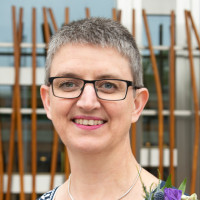We must do everything we can to tackle violence against women and girls.
Scottish Greens equality spokesperson Maggie Chapman MSP gave a powerful speech on 16 Days Against Gender-Based Violence. Here is the speech in full.

It’s vitally important that every year we have this debate. But there’s a danger, too, in the familiarity of this annual ritual, that we lose the anger of activism, that we rest in a cosy consensus, that we think about this for sixteen days and then we return to the status quo.
But the status quo, for millions of women and girls, is a place of pain and horror. We cannot, we must not, treat gender-based violence as a standalone issue, divorced from the rest of what we do. We need, every year, not just sixteen, but 365 days of activism.
And we need to use them well. This year our national theme, Imagine a Scotland without gender-based violence, is about our vision for this specific place, while the UN focus, Invest to prevent violence against women and girls, is about tangible action everywhere, especially economic and financial measures. We need both – the vision and the bold action.
And we need clarity about the breadth and depth of the work to be done. There are fantastic initiatives happening during this year’s campaign, including much that’s about survival, support and the stories that individual women share. It’s crucial that we listen to these, but we also need to hear and learn from feminist experts about the kind of structural and policy changes that can transform the lives, the safety and the freedom of women and girls.
Professor Jacqui True in her award-winning book, The Political Economy of Violence Against Women, focused on two key areas of potential solution: economic empowerment of women and men changing men through positive example. I spoke about men this time last year, how across a series of debates about violence against women, only a handful of our male colleagues spoke at all.
But this year I want to talk about Professor True’s other focus. Because gender-based violence is an economic issue, on many levels.
We know that poverty is both a cause and a consequence of violence, with globalised economies that treat both women and men, and the lands where they live, as mere counters in a game of toxic capitalism.
We know that violence against women is not only a matter of physical acts perpetrated by one individual upon another but includes, within the official UN definition, economic exploitation.
We know that women face violence in the workplace and in the experience of migrating for work, violence that is enabled and perpetrated through unjust and inhuman immigration and trade policies.
And we know that in the experience and aftermath of natural disaster, climate catastrophe and armed conflict, women and their children suffer the most, including from deliberate violence.
So that imagined Scotland of this year’s theme would have, not just transformed attitudes and behaviour, an end to acts of individual misogyny, but transformed economic systems, power structures, global and environmental responsibilities.
If we are to take this vision seriously, then every time we consider a policy, we must ask ourselves what effect it will have – will it act to increase or decrease the violence faced by women and girls? And I’m grateful for the briefings from Close the Gap, Engender and Zero Tolerance that set out some of the ways we can do this. That means, within our devolved powers, looking not just at criminal justice, but at economy, social security, finance, education, health and environment. And it means speaking boldly about reserved policy areas, especially defence, immigration and trade.
On Monday evening I, with hundreds of others, walked through Dundee in safety and solidarity, as part of this year’s Reclaim the Night march. Our task here is to help reclaim not just the night, but the day and every day to come, for the women and girls of Scotland and of the world beyond.
